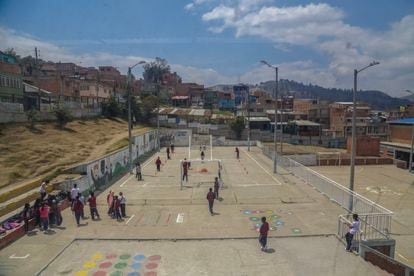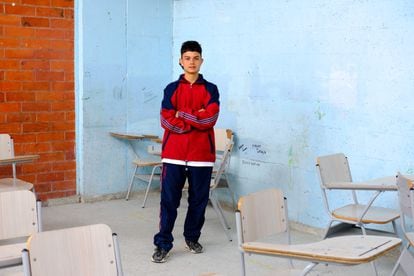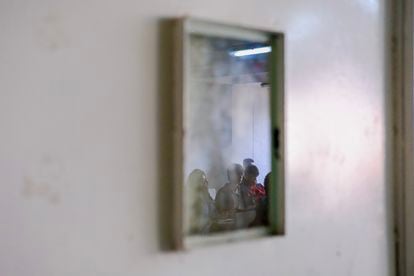EL PAÍS offers the América Futura section openly for its daily and global information contribution on sustainable development. If you want to support our journalism, subscribe here.
Yenifer Cano dropped out of school, even though she was only two years away from graduating. In 2023, when she turned 18, she left the books for a full-time job, because she was more tormented by the lack of food at home than by achieving a bachelor's degree. “It was something that most of my classmates thought. “Everyone was talking about stopping studying and having money,” argues the teenager from Soacha, a peripheral municipality of Bogotá, which geographically seems like an extension of the city, but on a social level sometimes resembles a forgotten town in the Andes. There, more than 47% of the inhabitants live in poverty, according to data from the local Mayor's Office, and many young people are considering alternative paths to education in the face of the daily battle to survive.
For Cano, the desire to have her own money and take a burden off her mother, who alone carried the responsibility of three children, made her think that leaving school was a logical option. “I saw my mother very tired and sick. I wanted to help her,” says the young woman, who became one of the 291,304 people who dropped out of secondary education in Colombia last year, according to the Ministry of Education. In 2023, the school dropout rate in Bogotá was 2.8%, while in Soacha it rose to 4.6%. An enormous difference if you think about a gigantic municipality of more than a million inhabitants, which is not separated from the most important city in the country.
At the Julio César Turbay school, where Cano studied, it is common for students to live in homes where eating meat or chicken is considered a luxury reserved for special days. Invasion neighborhoods where the dust from the streets mixes with the air, and the roofs of the houses have silicone plugs to prevent leaks. Places where thousands of migrant and displaced families have settled to be close to Bogotá with the hope of a promising future, but facing the needs of a life that can only be faced one day at a time. These were the things in the home that Cano left behind to go live with her boyfriend. A house run by a single mother who worked two jobs to ensure shelter and food for her children.
That same woman is now asking her daughter to return to class. “She tells me to finish high school because I'm going to need it for everything,” Cano says, avoiding her gaze. She does not plan to return to school, but she says that in the future she will validate the years she missed in an adult education institution. However, there is no scheduled date for that to happen. In her case, as in many others, interrupting secondary education is a generational pattern. Neither her grandmother nor her mother finished school, but they hope that she will.

The same thing happens to Paola Cuervo, who does not want the future of any of her four children to resemble her life. “Our situation is very difficult, but I want them to have education above all else,” says the 36-year-old single mother, who was barely able to finish primary school. The woman has a monthly income of about 400,000 pesos (100 dollars), with which she tries to support the three children who still live next to her. With her sporadic job delivering flyers on the street, Cuervo lives with the permanent uncertainty of what Yorbinson, Evelyn and Daniela will eat the next day.
For now, his greatest wish is for his second son, Yorbinson Ramírez, 16, to graduate at the end of 2025, from the same school that Cano left behind. “I help him however I can to encourage him to study,” says the mother through tears. Cuervo does not work full time because he does not have support to care for his daughter Daniela, a five-year-old girl who suffers from Down syndrome.
Faced with this reality, Ramírez can only think about the money his mother and sisters need. “When I leave school, I want to work to earn money or study something to earn money,” he says, clenching his knuckles. Although he assures that he will continue studying, the young man is also haunted by the temptation to change the life of his family outside of a classroom. Although he loves football and sports, he doesn't give himself permission to have expectations. “Let's see,” says the young man, rolling his eyes, “we are in Soacha and this is not a private school,” he concludes sarcastically.

An education in a state of emergency
Although his phrase sounds hopeless, it is not without justifications. Even Gerardo Rodríguez, rector of Julio César Turbay, als
o sympathizes in his own way with that phrase. “The majority of young people have no future prospects here, and it is very sad to know that education has a lot left to do,” says the 62-year-old educator, who has directed the institution for more than a decade, with a bitter tone.
From his gestures, you can tell that he is in love with his profession, but he is often disillusioned with the system in which he works. “Outside of the teaching payroll, at the school we have an annual budget of around 300 million pesos (77,000 dollars), which results in about 8,000 pesos (2 dollars) per month per student,” explains the director of the educational center, embarrassed. of 2,700 students. With that money, there are no funds left for sports or cultural activities in an area surrounded by organized crime and micro-trafficking.
The Soacha education secretary clarifies that their budget is not even enough to cover all the teachers' salaries, much less to have replacements. Therefore, it is not strange that the students of Julio César Turbay are alone during some hours of class, in the absence of a teacher. “We have to ask the ministry for reinforcement to cover the payroll,” says José Yhoan Alfonso, who is in charge of that department. But he regrets that the area's schools are at the bottom of priorities in Colombia. “Soacha has the penultimate worst educational budget per student in the entire country,” highlights the official.
Faced with the shortcomings of institutions and homes, adolescents are losing hope for a future different from that of their parents, among buildings with unpainted walls without green areas. Despite the efforts of educators like Rodríguez, the changes that are being attempted in schools seem few in the face of the challenging panorama of thousands of low-income young people. “We try to motivate them with success stories of our graduates,” declares Rodríguez, who does not miss the opportunity to celebrate the triumphs of each student who sets foot in the institution.
The teacher has allied himself with those trying to help change the lives of students. For this reason, he opened the doors to Fundación Apoyar, an organization dedicated to providing support in educational and development processes for children and young people in Colombia. For just over two years, the NGO has been helping students who have problems at school with academic and psychosocial support, and the offer of cultural activities. “It is an effort for the children to continue with their education and be able to spend their time in a healthy way,” emphasizes Mayerly Donato, head of the project. During his stay at the institution, the foundation started a batucada group to encourage teenagers through music, and has impacted more than 200 students to continue their studies in better conditions.
Dream without permission
Every effort of the organizations, teachers and leaders who care about their work is aimed at ensuring that the youth of the municipality can develop their life projects. For Cano to become a stewardess or enter the army as she wishes, and for Ramírez to dare to fantasize about a different life for him and his family. This is how Rodríguez sees it from his office in the rectory at the Julio Cesar Turbay center. “The dream pursued is that all boys, girls and young people become what they want to be regardless of where they come from,” he highlights with enthusiasm. He is convinced that youth aspirations can be achieved. He confirmed it when, without resources, he managed to become a teacher, and when he saw Gustavo Petro, one of his schoolmates, become president of Colombia.

#largest #suburb #Bogotá #teenagers #fight #leave #school